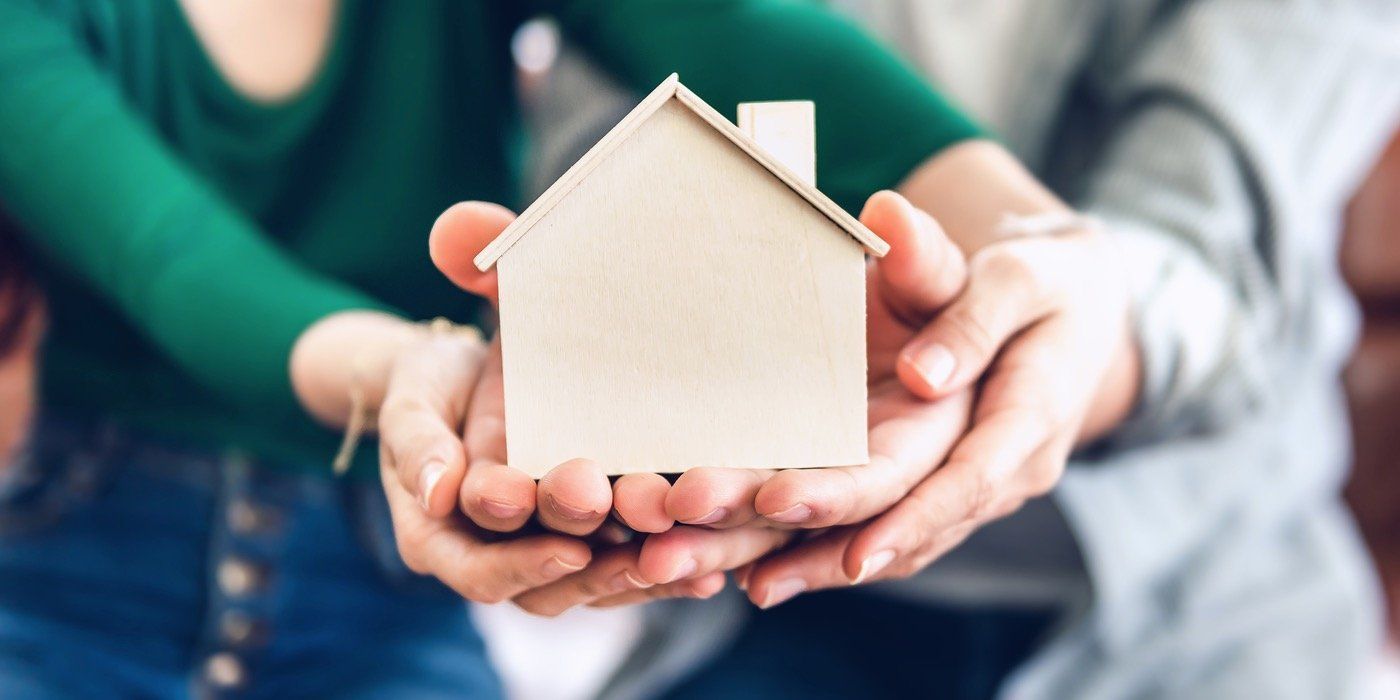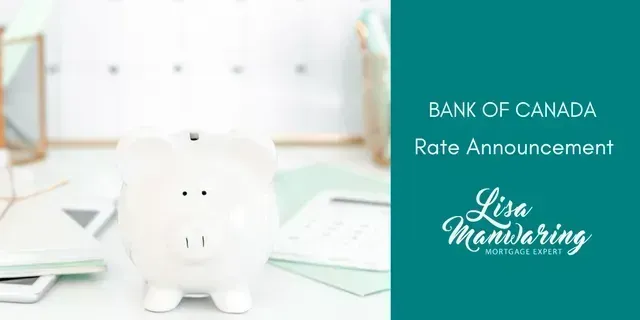Deferring Mortgage Payments. (Covid-19)
Lisa Manwaring • March 23, 2020

In response to the Covid-19 crisis; for those individuals financially affected, banks and the government have announced that payment relief may be available for up to 6 months of deferred mortgage payments.
As information is changing daily, or hourly, if you have any questions, please contact me directly to discuss your financial situation. The following information is a general guideline, each lender deals with things a little differently. So, here’s what you need to know.
Do you qualify for deferred payments?
Just because lenders are offering deferred mortgage payments, doesn’t mean you will qualify. Lenders are looking at each case individually and will only offer deferral upon their sole discretion. If you haven’t experienced income disruption, you won’t be eligible for payment deferral.
To qualify, you will have to prove not only that you have been directly financially impacted by Covid-19, but that you have no other means of making your mortgage payments. In other words, you have to prove genuine financial hardship.
Before making an application to your lender for deferred payments, you should consider applying for EI and continue making your payments as scheduled. Good advice is only to contact your lender if you have an immediate need and you would otherwise default on your payments.
Deferred doesn’t mean free
To be clear, deferred does not mean free. If you defer your payments for up to 6 months, you will still be responsible for paying that money to the lender. In fact, at most lenders, deferred payments could be added on to the principal mortgage amount and could incur additional interest.
Once your payments are resumed, they might increase your regular payment to maintain your existing amortization schedule.
Applying to defer your mortgage payments
If you are in a place where your only option is to defer payments, so you don’t get behind or default on your mortgage, you should contact your lender directly. Should you call and not get through, consider sending an email. Here is a template for you to follow. Edit as required.
Subject: “your name” & “mortgage #”
My name is “your name”. I would like to inquire about mortgage payment relief. My income has been disrupted by the Covid-19 virus, and I have limited means to make upcoming mortgage payments.
My address is “insert address”, and my contact information is “provide the best way to contact you”.
Please advise of the next steps.
“your name.”
Will deferring mortgage payments impact your credit score?
The simple answer is, no. A lender approved deferral is not like missing a mortgage payment. However, if you don’t communicate with your lender and just skip a payment, it could negatively impact your credit score.
Now, the truth is, payment deferral shouldn't impact your credit score, BUT, in these unprecedented times, and with the overwhelming number of deferral applications and banks having never handled anything like this before, it wouldn’t be a big stretch to imagine that mistakes could be made. Misinformation could get misreported to the credit bureaus.
Other mortgage options
Payment deferral isn’t the only option you have at this time. You may qualify for any of the following:
A mortgage refinance
Restoration of your original amortization (to lower your payment)
Hold a payment (during a temporary suspension of income)
Negotiated reduction of payments
If you are in a place where the Covid-19 has financially impacted you, and you need someone to discuss all your options - including deferring payments, please contact me anytime.
Let's discuss your financial situation and work together on a plan to get you through this!
RECENT POSTS

If you're a homeowner juggling multiple debts, you're not alone. Credit cards, car loans, lines of credit—it can feel like you’re paying out in every direction with no end in sight. But what if there was a smarter way to handle it? Good news: there is. And it starts with your home. Use the Equity You’ve Built to Lighten the Load Every mortgage payment you make, every bit your home appreciates—you're building equity. And that equity can be a powerful financial tool. Instead of letting high-interest debts drain your income, you can leverage your home’s equity to combine and simplify what you owe into one manageable, lower-interest payment. What Does That Look Like? This strategy is called debt consolidation , and there are a few ways to do it: Refinance your existing mortgage Access a Home Equity Line of Credit (HELOC) Take out a second mortgage Each option has its own pros and cons, and the right one depends on your situation. That’s where I come in—we’ll look at the numbers together and choose the best path forward. What Can You Consolidate? You can roll most types of consumer debt into your mortgage, including: Credit cards Personal loans Payday loans Car loans Unsecured lines of credit Student loans These types of debts often come with sky-high interest rates. When you consolidate them into a mortgage—secured by your home—you can typically access much lower rates, freeing up cash flow and reducing financial stress. Why This Works Debt consolidation through your mortgage offers: Lower interest rates (often significantly lower than credit cards or payday loans) One simple monthly payment Potential for faster repayment Improved cash flow And if your mortgage allows prepayment privileges—like lump-sum payments or increased monthly payments—those features can help you pay everything off even faster. Smart Strategy, Not Just a Quick Fix This isn’t just about lowering your monthly bills (although that’s a major perk). It’s about restructuring your finances in a way that’s sustainable, efficient, and empowering. Instead of feeling like you're constantly catching up, you can create a plan to move forward with confidence—and even start saving again. Here’s What the Process Looks Like: Review your current debts and cash flow Assess how much equity you’ve built in your home Explore consolidation options that fit your goals Create a personalized plan to streamline your payments and reduce overall costs Ready to Regain Control? If your debts are holding you back and you're ready to use the equity you've worked hard to build, let's talk. There’s no pressure—just a practical conversation about your options and how to move toward a more flexible, debt-free future. Reach out today. I’m here to help you make the most of what you already have.

Bank of Canada maintains policy rate at 2¼%. FOR IMMEDIATE RELEASE Media Relations Ottawa, Ontario January 28, 2026 The Bank of Canada today held its target for the overnight rate at 2.25%, with the Bank Rate at 2.5% and the deposit rate at 2.20%. The outlook for the global and Canadian economies is little changed relative to the projection in the October Monetary Policy Report (MPR). However, the outlook is vulnerable to unpredictable US trade policies and geopolitical risks. Economic growth in the United States continues to outpace expectations and is projected to remain solid, driven by AI-related investment and consumer spending. Tariffs are pushing up US inflation, although their effect is expected to fade gradually later this year. In the euro area, growth has been supported by activity in service sectors and will get additional support from fiscal policy. China’s GDP growth is expected to slow gradually, as weakening domestic demand offsets strength in exports. Overall, the Bank expects global growth to average about 3% over the projection horizon. Global financial conditions have remained accommodative overall. Recent weakness in the US dollar has pushed the Canadian dollar above 72 cents, roughly where it had been since the October MPR. Oil prices have been fluctuating in response to geopolitical events and, going forward, are assumed to be slightly below the levels in the October report. US trade restrictions and uncertainty continue to disrupt growth in Canada. After a strong third quarter, GDP growth in the fourth quarter likely stalled. Exports continue to be buffeted by US tariffs, while domestic demand appears to be picking up. Employment has risen in recent months. Still, the unemployment rate remains elevated at 6.8% and relatively few businesses say they plan to hire more workers. Economic growth is projected to be modest in the near term as population growth slows and Canada adjusts to US protectionism. In the projection, consumer spending holds up and business investment strengthens gradually, with fiscal policy providing some support. The Bank projects growth of 1.1% in 2026 and 1.5% in 2027, broadly in line with the October projection. A key source of uncertainty is the upcoming review of the Canada-US-Mexico Agreement. CPI inflation picked up in December to 2.4%, boosted by base-year effects linked to last winter’s GST/HST holiday. Excluding the effect of changes in taxes, inflation has been slowing since September. The Bank’s preferred measures of core inflation have eased from 3% in October to around 2½% in December. Inflation was 2.1% in 2025 and the Bank expects inflation to stay close to the 2% target over the projection period, with trade-related cost pressures offset by excess supply. Monetary policy is focused on keeping inflation close to the 2% target while helping the economy through this period of structural adjustment. Governing Council judges the current policy rate remains appropriate, conditional on the economy evolving broadly in line with the outlook we published today. However, uncertainty is heightened and we are monitoring risks closely. If the outlook changes, we are prepared to respond. The Bank is committed to ensuring that Canadians continue to have confidence in price stability through this period of global upheaval. Information note The next scheduled date for announcing the overnight rate target is March 18, 2026. The Bank’s next MPR will be released on April 29, 2026. Read the January 28th, 2026 Monetary Report


